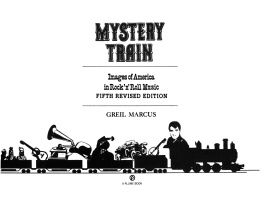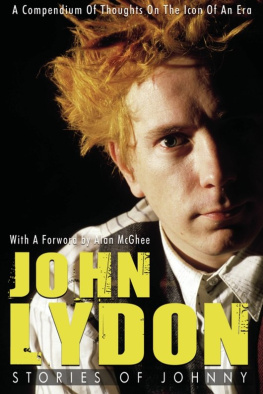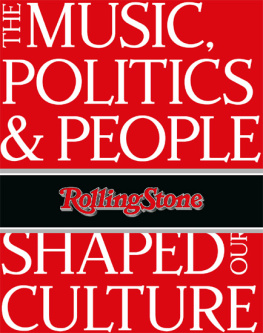More Real Life Rock
Also by Greil Marcus
Mystery Train: Images of America in Rock n Roll Music (1975, Folio Society edition, 2015)
Lipstick Traces: A Secret History of the Twentieth Century (1989, 2009)
Dead Elvis: A Chronicle of a Cultural Obsession (1991)
Ranters & Crowd Pleasers: Punk in Pop Music, 19771992 (1993, published 1999 as In the Fascist Bathroom: Writings on Punk, 19771992)
The Dustbin of History (1995)
Invisible Republic: Bob Dylans Basement Tapes (1997, published 2000 as The Old Weird America: The World of Bob Dylans Basement Tapes)
Double Trouble: Bill Clinton and Elvis Presley in a World of No Alternatives (2000)
The Manchurian Candidate (2002)
Like a Rolling Stone: Bob Dylan at the Crossroads (2005)
The Shape of Things to Come: Prophecy and the American Voice (2006)
When That Rough God Goes Riding: Listening to Van Morrison (2010)
Bob Dylan by Greil Marcus: Writings, 19682010 (2010)
The Doors: A Lifetime of Listening to Five Mean Years (2011)
The History of Rock n Roll in Ten Songs (2014)
Real Life Rock: The Complete Top Ten Columns, 19862014 (2015)
Three Songs, Three Singers, Three Nations (2015)
Under the Red White and Blue: Patriotism, Disenchantment and the Stubborn Myth of the Great Gatsby (2020)
AS EDITOR
Stranded (1979, 2007)
Psychotic Reactions & Carburetor Dung, by Lester Bangs (1987)
The Rose & the Briar: Death, Love, and Liberty in the American Ballad (2004, with Sean Wilentz)
Best Music Writing 2009 (2009)
A New Literary History of America (2009, with Werner Sollors)
More Real Life Rock
The Wilderness Years, 2014 2021
GREIL MARCUS

Published with assistance from the foundation established in memory of Calvin Chapin of the Class of 1788, Yale College.
Copyright 2022 by Greil Marcus.
All rights reserved.
This book may not be reproduced, in whole or in part, including illustrations, in any form (beyond that copying permitted by Sections 107 and 108 of the U.S. Copyright Law and except by reviewers for the public press), without written permission from the publishers.
Stolen Car by Bruce Springsteen. Copyright 1980 Bruce Springsteen (Global Music Rights). Reprinted by permission. International copyright secured. All rights reserved.
Once Were Brothers, lyrics by Robbie Robertson. Reprinted by permission.
Yale University Press books may be purchased in quantity for educational, business, or promotional use. For information, please e-mail sales.press@yale.edu (U.S. office) or sales@yaleup.co.uk (U.K. office).
Designed by Sonia L. Shannon.
Set in Electra and Sans types by Westchester Publishing Services.
Library of Congress Control Number: 2021942568
ISBN 978-0-300-26098-4 (hardcover : alk. paper)
A catalogue record for this book is available from the British Library.
This paper meets the requirements of ANSI/NISO Z39.48-1992
(Permanence of Paper).
For Emily
Contents
Acknowledgments
MY FIRST THANKS GO TO those who gave my column a home, no matter that I kept finding that what I thought was my own room was more like couch-surfing from one place to another: at the Barnes & Noble Review, Jim Mustich, Nick Curley, and Bill Tipper; at Pitchfork, Mark Richardson; the staff of the Village Voice; at rollingstone.com, Jon Dolan; at the Los Angeles Review of Books, Boris Drayluk, Cord Brooks, Tom Lutz, and Steve Erickson. I owe a special debt to Joe Levy, the real editor behind the columns space at the Village Voice and Rolling Stonea special irony, given our history with the thing. And I thank with continuing surprise at my good fortune all of those who accepted assignments to cover shows I couldnt attend, who took the column as a forum for whatever they might have to say, who had as much fun with it as I did: Bruce Jenkins, Molly Gallentine, Joe Christiano, Cecily Marcus, John Rockwell, Michael Zilkha, Doug Kroll, Jo Anne Fordham, Andy Bienen, Tamar Newberger, Corin Tucker, Joshua Clover, Joel Selvin, Michael Robbins, Steve Perry, John Shaw, Lucy Gray, Robert Fiore, Elizabeth Flock, Mia Hanson-Lve, Rob Hatch-Miller, Pearl Perry, Rose Perry, Gina Arnold, Bill Brown, Eddie Muller, Grzegorz Kwiatowski, Barry Franklin, Ted Widmer, Peter Guralnick, Betsy Bowden, Joerg Haentzchal, John Langford, Uhuru Comix, Daveed Diggs, Shannon McArdle, Bill Wyman, Sarah Vowell, Emily Marcus, Sean Wilentz, Steve Weinstein, Chuck Bromley, Haim Schweky, and Charles Taylor. With some exceptions (the White House, a few more), the friend, or the person listening, or the person watching who appears in these pages is Jenny Marcus.
At Yale, I again had the generous counsel of John Donatich and Susan Laity (above and beyond), the never-falling-a-day-behind collaboration of Abbie Storch, the resourcefulness of Jennifer Doerr, and the care of the designer, Sonia Shannon. I thank as well Rich Black, who designed the jacket, based on a photo by the probing and generous Fred Kihn (Paris); the indexer Meridith Murray; and especially the peerless raconteur as copy editor Dan Heaton. At Brandt and Hochman, I can never thank Emily Forland enoughand I thank too Marianne Merola, Henry Thayer, and John Spano.
And thanks to Steve Wasserman, who thought of it first.
Introduction
TOO MANY OF THE BOOKS Ive written have had presidents looming behind them. I wrote my first, Mystery Train, during the Watergate crisis; I finished it the day Richard Nixon resigned. Driven by love, pessimism, fatalism, and rage, the book was an embrace of the country. My next, Lipstick Traces, was a Reagan book from start to finish: I began writing in 1980 and finished it as his second term was ending. As a Californian, I knew what he was about, and how serious he was about leaving the country forever changed. I couldnt bear to look at the nation as it shifted under his hand. People talk all the time during elections about how if so-and-so is elected theyll leave the country. Its self-flattering nonsense, people tending the flame of their own purity. They never do it. But in a way I did. For nine years I left the USA for Europe, at least in the pages I read and those I tried to write, struggling with the half-a-millennium history of the European avant-garde, where such American ideals as equality, democracy, individualism, and a joint-stock world were foreign, where it made sense for those who considered themselves illuminated to speak as if they should legislate the future and the past. Maybe it was a failure of nerve, but it was the only story I could bear to listen to. Ive been stuck in Paris in 1952 for three years and I cant get out, I said to my wife one day in Berkeley in 1987. There are worse places to be, she said.
I wrote The Old, Weird America (which the late Nick Tosches said I said pretended to be about Bob Dylans basement tapes when it was really about Dock Boggs) in the mid-1990s. It was a Bill Clinton book. I liked him. He let me back into the American story. The Shape of Things to Come came out of the terrorist attacks of 2001. To me that was a biblical event. It raised the question of whether America existed at all. I heard the prophetic tradition in American speech, and artists in the present taking up that language, and tried to listen to the different Americas they displayed when they did sotried to listen to David Thomass cracker-barrel tall tales and Laura Palmers screams.
Next page




